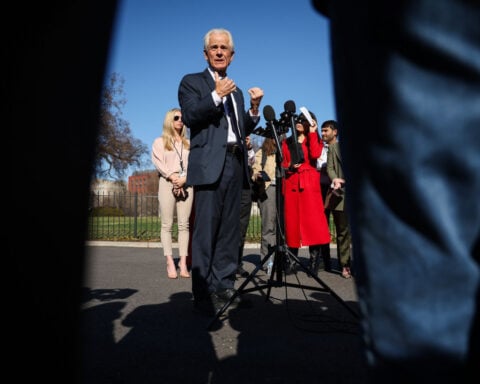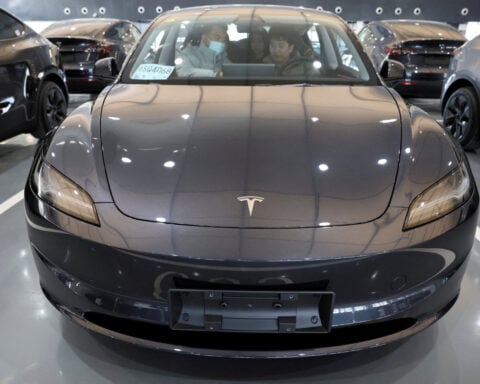By Lucia Mutikani
WASHINGTON (Reuters) - U.S. retail sales fell for the first time in seven months in October as motor vehicle purchases and spending on hobbies dropped, pointing to slowing demand at the start of the fourth quarter that further strengthened expectations the Federal Reserve is done hiking interest rates.
That was supported by other data on Wednesday showing the biggest decline in producer prices in three-and-a-half years in October on the back of cheaper gasoline. The reports followed on the heels of news on Tuesday that consumer prices were unchanged last month for the first time in more than a year.

The data, combined with a cooling labor market, led economists to conclude that the U.S. central bank's current rate hiking cycle was over. Still, there is no sign that the economy is sliding into recession. The drop in sales in October was less than expected and followed three straight months of hefty gains.
"Signs of moderating consumer demand and inflation argue for an extended Fed pause," said Lydia Boussour, senior economist at EY-Parthenon in New York. "While we believe the Fed is done raising interest rates, the bar is still high for rate cuts."
Retail sales slipped 0.1% last month, the Commerce Department's Census Bureau said. Data for September was revised higher to show sales increasing 0.9% instead of the previously reported 0.7% rise. Economists polled by Reuters had forecast retail sales would fall 0.3%.
Retail sales are mostly goods and are not adjusted for inflation. Sales were mixed last month, with receipts at motor vehicles and parts dealers falling 1.1%. Economists attributed some of the decrease to the recently ended United Auto Workers strike, which could have limited supply.
Furniture store sales dropped 2.0%, while receipts at building material and garden equipment outlets slipped 0.3%. There was a 1.7% decline in sales at miscellaneous retailers. Sporting goods, hobby, musical instrument and book stores sales fell 0.8%.
Clothing store sales were unchanged, while receipts at electronics and appliance outlets rose 0.6%. Online sales rose 0.2%, despite Amazon's second Prime Day promotion.
Sales at food services and drinking places, the only services component in the report, gained 0.3%. Economists view dining out as a key indicator of household finances.
Receipts also rose at health and personal care stores as well as food and beverage outlets. Though some of the dip in retail sales was payback after the recent streak of strong growth, it was also a sign that consumers are feeling the heat from higher borrowing costs, with most lower-income families relying on credit cards to fund purchases after exhausting excess savings accumulated during the COVID-19 pandemic.
Student loan repayments resumed for millions of Americans, but recent data from the Bank of America Institute showed no indication yet that the change was negatively impacting spending.
Target on Wednesday forecast a holiday-quarter profit largely above Wall Street expectations, but noted that consumers were delaying spending until the last minute, which CEO Brian Cornell said was "a clear indication of the pressures they're facing as they work to stretch their budgets until the next paycheck."
Stocks on Wall Street extended Tuesday's rally. The dollar rose against a basket of currencies. U.S. Treasury prices fell.
CONSUMER SPENDING COOLING
Financial markets are anticipating a rate cut next May, according to CME Group's FedWatch Tool. Since March 2022, the Fed has raised its benchmark overnight interest rate by 525 basis points to the current 5.25%-5.50% range.
Excluding automobiles, gasoline, building materials and food services, retail sales rose 0.2% in October. Data for September was revised up to show these so-called core retail sales rising 0.7% instead of the previously reported 0.6%.
Core retail sales correspond most closely with the consumer spending component of GDP. Economists expect inflation-adjusted consumer spending to grow at about a 2% annualized rate this quarter, half the 4.0% pace logged in the third quarter.
The Atlanta Fed is forecasting GDP to rise at a 2.2% rate, still above what Fed officials regard as the non-inflationary growth rate of around 1.8%. Fourth-quarter growth is also likely to be supported by steady inventory investment. The economy accelerated at a 4.9% rate in the July-September quarter.
A separate report from the Labor Department's Bureau of Labor Statistics on Wednesday showed the producer price index for final demand declined 0.5% in October, the largest decrease since April 2020. The PPI rose 0.4% in September.
Economists had forecast the PPI would edge up 0.1%. In the 12 months through October, the PPI increased 1.3% after rising 2.2% in September.
Wholesale goods prices dropped 1.4%, with a 15.3 plunge in gasoline accounting for more than 80% of the decline. Goods prices rose 0.8% in September.
The cost of services was unchanged after increasing 0.2% in the prior month. There were increases in the costs of airfares, inpatient and outpatient care as well as transportation of freight by road. But portfolio management fees and prices for motel and hotel rooms fell.
Airfares and portfolio management fees are some of the components that go into the calculation of the personal consumption expenditures price indexes, the inflation measures tracked by the Fed for its 2% target.
With the CPI and PPI data in hand, economists estimated that the core PCE price index increased 0.2% in October after rising 0.3% in September. That would lower the annual increase in the core PCE price index to 3.5%, which would be the smallest gain since April 2021, from 3.7% in September.
"Fed officials are getting to keep their cake and eat it too, so far," said Christopher Rupkey, chief economist at FWDBONDS in New York. "The economy is not too cold and not too hot. It is just right for now."
(Reporting by Lucia Mutikani; Editing by Chizu Nomiyama and Paul Simao)

 Trump has begun another trade war. Here's a timeline of how we got here
Trump has begun another trade war. Here's a timeline of how we got here
 Canada's leader laments lost friendship with US in town that sheltered stranded Americans after 9/11
Canada's leader laments lost friendship with US in town that sheltered stranded Americans after 9/11
 Chinese EV giant BYD's fourth-quarter profit leaps 73%
Chinese EV giant BYD's fourth-quarter profit leaps 73%
 You're an American in another land? Prepare to talk about the why and how of Trump 2.0
You're an American in another land? Prepare to talk about the why and how of Trump 2.0
 Chalk talk: Star power, top teams and No. 5 seeds headline the women's March Madness Sweet 16
Chalk talk: Star power, top teams and No. 5 seeds headline the women's March Madness Sweet 16
 Purdue returns to Sweet 16 with 76-62 win over McNeese in March Madness
Purdue returns to Sweet 16 with 76-62 win over McNeese in March Madness








